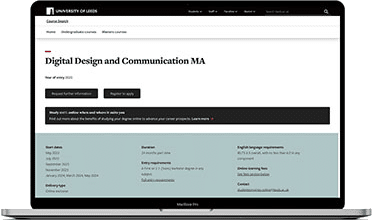6 In-Demand Digital Design Skills and How You Can Develop Them
Digital Design and Communication
Digital design skills required to succeed in the industry are both specialist and wide-ranging.
From expertise in design software such as Adobe Illustrator, to strong problem-solving and time-management skills, there are plenty of traits that aspiring design managers need to possess.
So, in this blog, we explore five of the most in-demand digital design skills right now and unpick how they can be developed to aid career progression.
Learn more about our Digital Design and Communication MastersWhy are digital design skills important?
Team managers hiring digital designers are looking for a unique set of soft skills and technical ability in their new hire to guarantee they can comfortably step into a design role, particularly for those working at a managerial level.
As a result, it’s crucial to continuously learn new things, so upskill in these six areas to gain new digital design skills which futureproof your career.
1. Proficiency using design software
Firstly, all digital designers need a strong understanding of design software and must be able to demonstrate competency with some of the most popular tools.
If you are working as a Digital Designer across any sub-sector of the industry, you are almost guaranteed to use design software in your day-to-day role, or if you’re in a Digital Design Manager role responsible for the output of the team, you must show guidance and direction in such tools to problem-solve.
Typically, proficiency in Adobe Creative Cloud, which encompasses Adobe Illustrator, Photoshop, and InDesign amongst others, is a basic requirement for all digital design roles.
For those specialising in other areas such as video production, motion graphics, animation, game design, and AR/VR content design, you’ll want to upskill in design tools relevant to your chosen area of interest.
2. UX design expertise
Expertise in user experience design (commonly referred to as UX) will be highly beneficial if you are working in digital design.
UX design is the process of creating practical and easy-to-use products or features (primarily in a digital environment) that meet consumer needs. Examples of UX can range from the placement of navigation buttons to the use of personalised notifications on a website.
To grow in this area, accustom yourself to software such as Adobe XD and Figma. Similarly, if you wish to specialise in UX design as a standalone area, you’ll want to be able to master these kinds of tools to demonstrate your proficiency.
3. UI design expertise
UI design is a shortened term for User Interface Design and refers to the visual design of a digital product. This typically involves translating wireframes which are produced by UX designers into user interfaces by creating visually on-brand and aesthetically pleasing products or features (for example, webpage graphics and imagery) that meet the needs of users and clients.
All digital designers need some form of UI design ability. At a minimum, you’ll be expected to have an eye for what UI design patterns work best in different scenarios and understand how to resolve any user interface issues at a basic level.
Understandably, expertise in user interface is also essential for those specialising in such roles. If you are working as a UI Design Manager, you’ll need to deep dive into audience behaviour to better understand improvements that need to be made.
4. Creative problem-solving
The ability to spot any design flaws and subsequently enhance the performance of a digital product is a common responsibility for digital design professionals, which can be achieved by design thinking techniques, making creative problem-solving our number one soft skill.
Additionally, those working in Digital Design Manager roles are likely to be responsible for finding new ways of working that can remove any workflow barriers in their design team. Creative problem-solving is therefore a key skill you’ll need to demonstrate if you want to progress into management.
5. Team working
Team working is another critical soft skill for digital designers to possess to effectively collaborate with other team members. This is particularly important in digital design, as you will be dealing with briefs that need to be well understood and converted from an idea into an actual product.
Also, if you are looking to take the step up into a management role, you will need to build good working relationships with both internal and external stakeholders whilst working with your team and motivating them to deliver upon your objectives.
Studying our digital design Masters is a great way to develop this important skill as you’ll be collaborating online with like-minded students from across the globe who are also passionate about the subject.
6. Time management
As a Digital Designer, you may have to juggle quite a few priorities. This could vary from assessing UI design in one moment to creating new social media design creatives in the next. Adding another layer of managing a team of people if you progress to a Digital Design Manager, makes time management another top soft skill.
You’ll need to effectively manage your time across a variety of projects, and priorities to meet the requirements of a range of clients and stay on top of your work, so it’s worth mastering a good working routine.
How important is digital design education?
While the digital design industry is very rewarding in terms of salaries and job satisfaction, competition for some of the top jobs is fierce.
That’s why formal digital design education is proving even more important for those looking to enter the field or progress to a management role.
Alongside some of the key technical and soft skills mentioned in this blog, designers need some tangible evidence of their knowledge to help their CV stand out and subsequently secure the best roles in digital design.
So, if you’re looking to enhance your digital design skills, it’s worth exploring further education and the benefits a postgraduate degree like a Masters can offer.
Where to look for digital design jobs
Once you are well-equipped with a firm set of skills and feel ready to embark on the next stage of your career, you’ll be wondering where to look for digital design jobs.
Whether you are looking to go into UI design, mobile app development or a broader graphic design job, you can use websites such as LinkedIn to find opportunities within your network, and Indeed.com to explore a range of the latest openings.
Dribbble is also a great website to hone your search as it focuses purely on digital design jobs, with an additional freelance section on the site for those looking for more flexible work. Toptal is also a great website to look for freelance work.
Whatever route you take to find your next move, it’s worth building a digital design portfolio and CV that showcases your best work for you to share with prospective employers. You could also reach out to employers directly for opportunities if you feel that you can offer the digital design skills and expertise they are after.
Study Digital Design and Communication online with the University of Leeds
Ready to develop your digital design skills?
Our online MA/Postgraduate Certificate in Digital Design and Communication is a unique course that integrates digital communication with digital design and explores the latest trends, design software and more to expand your knowledge of the creative industry.
It’ll help you become a creative strategic thinker and give you both the technical and soft digital design skills needed to thrive. Upon completion, you will have enhanced your skills to access some of the top management-level digital design jobs.
Enhance your creative and technical skills and transform your digital design career with an innovative online Masters in Digital Design and Communication.

Did you enjoy this blog? Here’s some related digital design and communication content you may be interested in:

Want to learn more about our online Digital Design and Communication course?
Check out the course content and how to apply.

